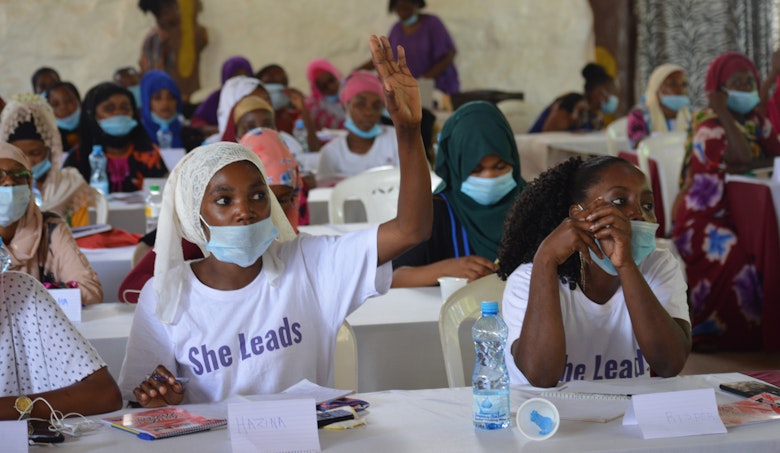She Leads Training in Kenya
Terre des Hommes Netherlands, in partnership with NAYA Kenya, conducted a three-day residential training aimed at strengthening the capacity of She Leads girl advocates on GYW-led and centred advocacy and leadership. The training of 42 Girls and Young Women (GYW) took place in Kwale County Kenya in November 2021.
GYW´s Voice in Action project
Prevailing in Kwale County are entrenched religious and cultural beliefs perpetuating negative stereotypes, discrimination, gender inequality, and socio-cultural norms around gender and masculinity. Conversations with Girls and Young Women confirm a systematic subordination of GYW. The challenges preventing them from achieving their aspirations include lack/limited access to education, cultural and social beliefs, abuse of power by community leaders, inadequate parental guidance, lack of financial independence and safe platforms for GYW to engage.
In line with this, Terre des Hommes Netherlands and NAYA Kenya joined forces to implement the GYW´s Voice in Action project in Kwale County aimed at challenging and influencing the aforementioned factors. The project will promote the institutionalisation of meaningful participation and influence of GYW in both formal and informal institutions in a more just and inclusive environment for promoting gender equity and equality.
Strengthening the capacity of GYWs
Strengthening the capacity of GYW advocates is a precondition for their meaningful, inclusive and sustainable participation in governance and decision making on issues affecting them. The 42 GYWs who represented the She Leads clubs were trained and equipped with knowledge and skills on leadership and advocacy, which they will in turn pass on the same to the other girl advocates in their respective clubs.
Wangari Maathai, a prime example
The training named Walking in the Footsteps of Wangari Maathai, used the case story of the late Nobel Laureate Wangari Maathai as a famous servant leader, her advocacy skills and how she used advocacy skills in her efforts in conservation and expanding the democratic and civic space in Kenya. The learners were able to relate to examples related to the issues they face in their localities including building relationships and movement and working together with others to hold decision-makers accountable.
Key highlights of the training
The facilitators employed a mix of methodologies to ensure interactive, practical and participatory processes including; group discussions, brainstorming sessions, role plays, simulation, games and exercises, presentations and participatory plenary discussions.
The key topics that covered during the sessions included:
- Leadership, qualities and characteristics of a good leader
- A plenary discussion where the Girls and Young Women reflected on their leadership journey and experiences from the Girls Advocacy Alliance project to the She Leads Project with a focus on the challenges, triumphs and key lessons learnt on leadership
- Participatory session on creating and sustaining relationships and alliances with key stakeholders including community members, leaders, government
- Refresher on understanding advocacy, forms of advocacy, levels of advocacy and differences between advocacy and behaviour change communication
- Leadership and advocacy challenges
- Theory and practice of meaningful and inclusive GYW participation using the Flower of Participation Approach
- Role modelling and learning from women leaders.
- Decision Making Skills and Leading from the front.
Training outcomes
The training sessions provided a great learning opportunity for all the participants. By the end of the training, the confidence of the girls and young women was strengthened as well as their civic consciousness to spearhead GYW-led advocacy initiatives for their meaningful participation and representation in decision-making. They attested to the improvement of their advocacy and leadership skills. They also identified advocacy issues that are of priority to them for their advocacy engagement within their communities, in the civic space and with government institutions at all levels. Additionally, all participants reflected on their advocacy approaches; identified what was working or not working in order to build on best practices so as to enable them to plan and execute well-designed lobby and advocacy actions.
Rispa, one of the girl advocates said, ¨She Leads to me is very important because of my goals. I saw the resolutions I had planned had no point because I had no one to hold my hand but when She Leads came, it advocated for girls and young women to be leaders and to know their rights.¨
She further added that ¨In our communities, I would suggest that they give girls the opportunity to express themselves. If they want to make decisions, involve those girls so everyone’s views are taken into consideration. Let there be equal rights between women and men.
Another girl advocate, Miriam, stated, ¨To our community leaders, I would like to tell them to support girls because it is the girl child who can change the world. If we build a woman, we have built a whole world!¨
By the end of the training, all the girls and young women committed to passing the knowledge that they had attained to the other girls and young women in the She Leads clubs as well as those who are not in the clubs.

